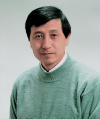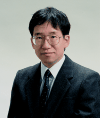


Next: Language Processing Systems Laboratory
Up: Department of Computer
Previous: Mathematical Foundation of ...
 / Qian Ping Gu / Professor
/ Qian Ping Gu / Professor
 / Takafumi Hayashi / Associate Professor
/ Takafumi Hayashi / Associate Professor
The research and education activities in this laboratory focus
on the theoretical foundations of computers and computations.
In particular, our work covers the following areas.
- Algorithms and computation;
- Programming languages; and
- Discrete mathematics and applications.
The research in this laboratory is divided into two parts.
The first part consists of the work that follows the research
in the above areas. The goal of this research is to provide
the theoretical foundations for the education and research
activities in this university.
The second part of our work is the creative research in some specific
areas of the theoretical foundations of computer science.
Currently, we are working on
- Parallel computation;
- Network communication; and
- Applications of discrete/combinatorial mathematics.
The recent impressive advances in VLSI and fiber optics
technologies have made it possible to design and build high-performance
parallel computers and computer networks.
Research in parallel computation and network
communication has become one of the most
important areas in computer science and is accelerating at a
rapid pace. We have been working in several principle areas
of parallel computation and network communication
such as, fault tolerant routing
in computer/communication networks,
multicolor routing on all-optical networks, and so on.
Another important area we are working on
is the applications of discrete/combinatorial mathematics
in image processing and mobile communication.
The research activities in this laboratory are based
on the free work of each faulty member.
Faculty members exchange their ideas and results through
regular seminars and free discussions to work
on common global areas.
Several leading experts in the world were invited to give talks
in several areas of computer science last year. These talks
have greatly stimulated and brought fresh air to the work here.
Joint researchs with other laboratories and other universities/institutions
have been actively conducted as well.
The members of this laboratory give lectures in
algorithms and data structures, programming languages,
computational complexity
and guide student extracurricular projects (SCCP).
Currently, there are two SCCP projects in this laboratory:
- Digital signal processing by Prof. Takafumi Hayashi.
The project is research and development of Digital signal processing
based on both DSP technolgy and number theory.
- Net-Sys Administtration by Prof. Takafumi Hayashi.
The project is research and development about the system administration.
Developing coursewares is another important teaching activity of
this laboratory.
Coursewares have been developed in the areas, Vector Calculus, Fourier
Analysis and Mathematics for CG. All of them feature top-down approaches
and self-learning by computers.
In the middle/long term plan, we will develop more coursewares
in parallel computation, machine learning, discrete mathematics, and so on,
based on our research works.
Refereed Journal Papers
-
Qian-Ping Gu and Shietung Peng.,
An efficient algorithm for $k$-pairwise disjoint paths in hypercubes.
Journal of Parallel and Distributed Computing, 2000.
vol. 60, pp. 764-774.
-
Hayashi, T. and Martens W.L.,
The synthesis of low-peak orthogonal-base-set
sequences using trigonometric function aliasing.
IEICE Trans. Fundamentals, 2000.
vol. E83-A, No. 8, pp. 1513--1522.
Refereed Proceeding Papers
-
Xinchen Liu and Qian-Ping Gu.,
Multicasts on WDM All-Optical Multistage Interconnection Networks.
Proc. of the 2001 International Conference
on Parallel and Distributed Systems (ICPADS'01),
To Appear, June 2001.
-
Qian-Ping Gu and Shietung Peng.,
Efficient Protocols for Permutation Routing
on All-Optical Multistage Interconnection Networks.
Proc. of International Conference on Parallel Processing (ICPP00),
pp. 513-520, August 2000.
-
Qian-Ping Gu and Shietung Peng.,
Wavelengths Requirement for Permutation Routing
on All-Optical Multistage Interconnection Networks.
Proc. of International Parallel and Distributed
Processing Symposium (IPDPS 2000), pp. 761-768, May 2000.
-
Hayashi, T.,
Low-peak orthogonal-base-set sequences synthesis
by using trigonometric function aliasing.
ISPACS2000, IEEE, pp. 797--804, Nov. 2000.
-
Hayashi, T.,
Uncorrelated low-peak pseudo white noise and binary sequence.
DSP2000, pp. 85-90, IEICE, Nov. 2000.
Books
-
Hayashi, T. and Dipak Basu.,
Dictionary of Pure and Applied Physics.
CRC, New York, 2000.
Grants
-
Takafumi Hayashi.
Ministry of Education Scientific Research Fund, for Young Researchers
(A), Engineering, Mechanical Engineering, Thesis No. 09750083
Academic Activities
-
Qian Ping Gu.
Vice chair of programm committee of the International
Symposium on Parallel Algorithms and Networks
(ISPAN'00), December 2000, Dallas USA.
-
Qian Ping Gu.
Vice chair of program committee of the Seventh International Conference on
Parallel and Distributed Systems (ICPADS'00), July 2000, Morioka Japan.
-
Qian Ping Gu.
Co-chair of program committee of the ICPP01
Workshop on Optical Networks Sept. 2001, Valencia Spain.
-
Takafumi Hayashi.
Vice chairman of publishing committee of JSAP (Japan Society of Applied
Physics, March 2000.
-
Takafumi Hayashi.
A refree for HC2000.
-
Takafumi Hayashi.
A refree for PerETTA 2000.
-
Takafumi Hayashi.
A refree for ICC 2001.
Others
-
Ayumu Oshimi.
Graduation Thesis: Application of low-peak pseudo white noise
synthesis to random number generation.
Univ. of aizu, 2000, Thesis Advisor: T. Hayashi.
-
Kazuhiro Ikeda.
Graduation Thesis: Development of a new CDMA system using low-peak
white noise sequences:estimation of bit error ratio.
Univ. of aizu, 2000, Thesis Advisor: T. Hayashi.
-
Takayuki Okamoto.
Graduation Thesis, Study on performanse of MAPOS : Forcusing
on the Transport layer.
Univ. of aizu, 2000, Thesis Advisor: T. Hayashi.
-
Hiroaki Narita.
Graduation Thesis: Development of a new CDMA system using low-peak
white noise sequences: design of encoding and decoding system.
Univ. of aizu, 2000, Thesis Advisor: T. Hayashi.
-
Ken Nishikata.
Graduation Thesis, Study on performanse of MAPOS : Forcusing
on the Datalink layer and the Physical layer.
Univ. of aizu, 2000, Thesis Advisor: T. Hayashi.



Next: Language Processing Systems Laboratory
Up: Department of Computer
Previous: Mathematical Foundation of ...
 / Qian Ping Gu / Professor
/ Qian Ping Gu / Professor
 / Takafumi Hayashi / Associate Professor
/ Takafumi Hayashi / Associate Professor



 / Qian Ping Gu / Professor
/ Qian Ping Gu / Professor
 / Takafumi Hayashi / Associate Professor
/ Takafumi Hayashi / Associate Professor


